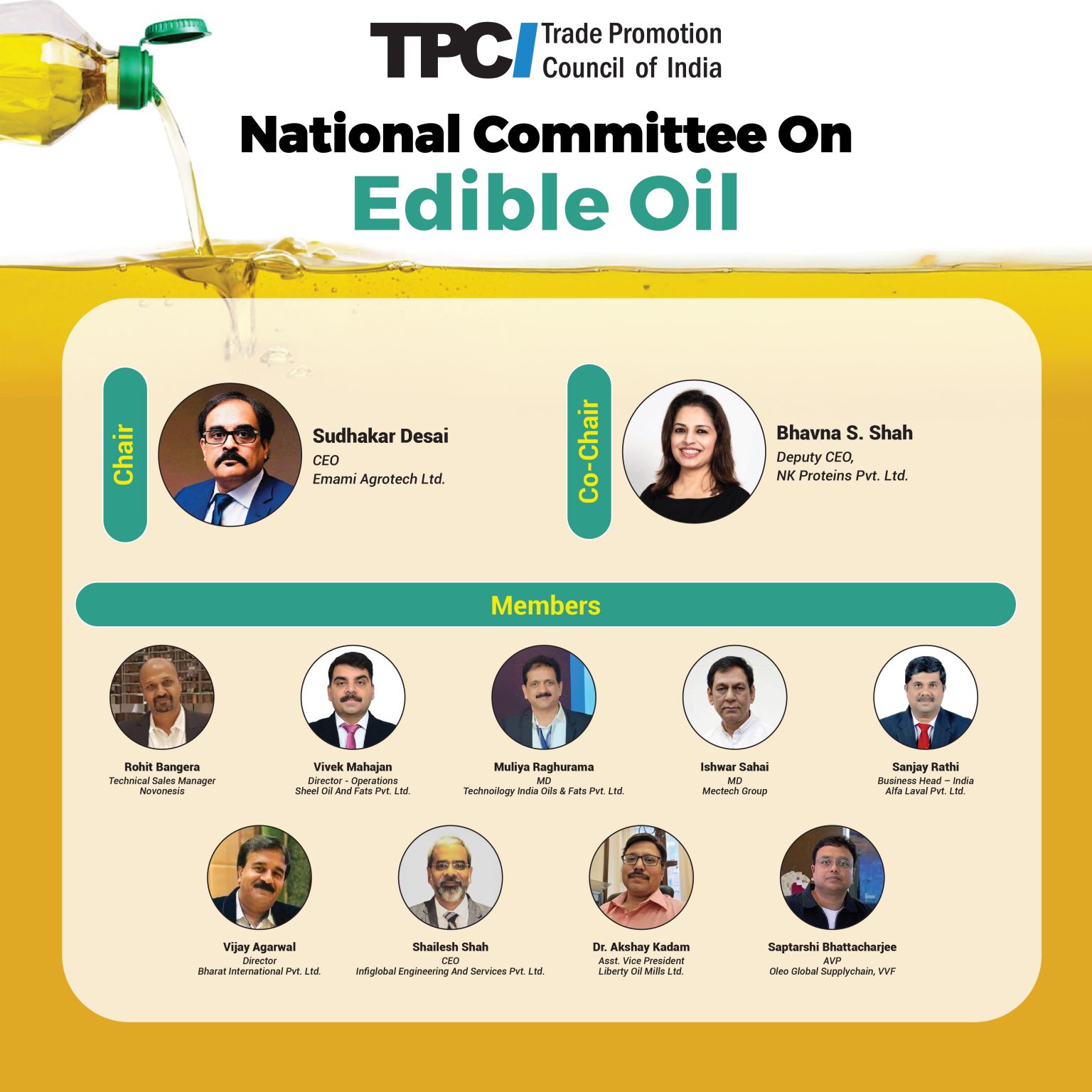TPCI launches its first National Committee on Edible Oil Industry
Trade Promotion Council of India (TPCI) has launched its first Edible Oil Committee, a landmark initiative to strengthen and promote India’s edible oil sector domestically and globally. The committee will unite leading producers, processors, and technology providers, creating a collaborative platform to drive dialogue, advocate policy reforms, and shape strategies for sustainable growth and global competitiveness.

The Trade Promotion Council of India (TPCI) has announced the formation of its first Edible Oil Committee, marking a significant step towards strengthening and promoting India’s edible oil sector both domestically and globally.
The committee brings together leading industry figures and experts from across the edible oil value chain, serving as a collaborative platform for dialogue, policy advocacy, and strategic interventions.
At its inaugural meeting, the committee unanimously elected Mr. Sudhakar Desai, CEO, Emami Agrotech Ltd., as Chairperson and Ms. Bhavna S. Shah, Deputy CEO, NK Proteins Pvt. Ltd., as Co-Chair.
Committee Members:
– Sudhakar Desai, CEO, Emami Agrotech Ltd (Chair)
– Bhavna S. Shah, Deputy CEO, NK Proteins Pvt Ltd (Co-Chair)
– Rohit Bangera, Technical Sales Manager, Novonesis
– Vivek Mahajan, Director – Operations, Sheel Oil and Fats Pvt Ltd
– Muliya Raghurama, MD, Technoilogy India Oils & Fats Pvt Ltd
– Ishwar Sahai, MD, Mectech Group
– Sanjay Rathi, Business Head – India, Alfa Laval Pvt Ltd
– Vijay Agarwal, Director, Bharat International Pvt Ltd
– Shailesh Shah, CEO, Infiglobal Engineering and Services Pvt Ltd
– Dr. Akshay Kadam, Assistant Vice President, Liberty Oil Mills Ltd
– Saptarshi Bhattacharjee, AVP, Oleo Global Supply Chain, VVF
According to Zion Market Research, the global edible oils market was valued at US$ 109.58 billion in 2023 and is projected to reach US$ 193.14 billion by 2032, growing at a CAGR of 6.5%.
India ranks fourth globally in the edible vegetable oil market after the United States, China, and Brazil. The country accounts for 15–20% of the global oilseed market, contributes 6–7% of world vegetable oil production, and represents 9–10% of global consumption. After food grains, oilseeds form the second most important crop group in Indian agriculture, with groundnut, rapeseed-mustard, soybean, and sunflower among the nine major oilseed crops cultivated across diverse agro-ecological zones.

India is the world’s leading producer of castor, safflower, sesame, and niger seeds, the second-largest producer of groundnut, and the third-largest producer of rapeseed-mustard. States such as Gujarat, Maharashtra, Madhya Pradesh, and Rajasthan together contribute over 77% of national oilseed output. In 2022–23, India recorded a historic high of 41.35 million tonnes of oilseeds, up by 3.39 million tonnes from the previous year.
Recognizing the sector’s strategic importance, the government is actively prioritizing domestic oilseed cultivation and implementing policies to make it a profitable and sustainable option for farmers. Initiatives such as the National Mission on Edible Oils, coupled with investments in technology, productivity enhancement, and farmer support, are laying the foundation for a more resilient edible oil ecosystem.
In this context, the TPCI’s Edible Oil Committee is expected to play a pivotal role in aligning policy, production, and market needs. By fostering industry collaboration, driving policy engagement, and enhancing India’s competitiveness in the global market, the committee will serve as a key platform to advance the sector’s future growth and contribute to the country’s broader goals of food security, nutrition, and global leadership.
